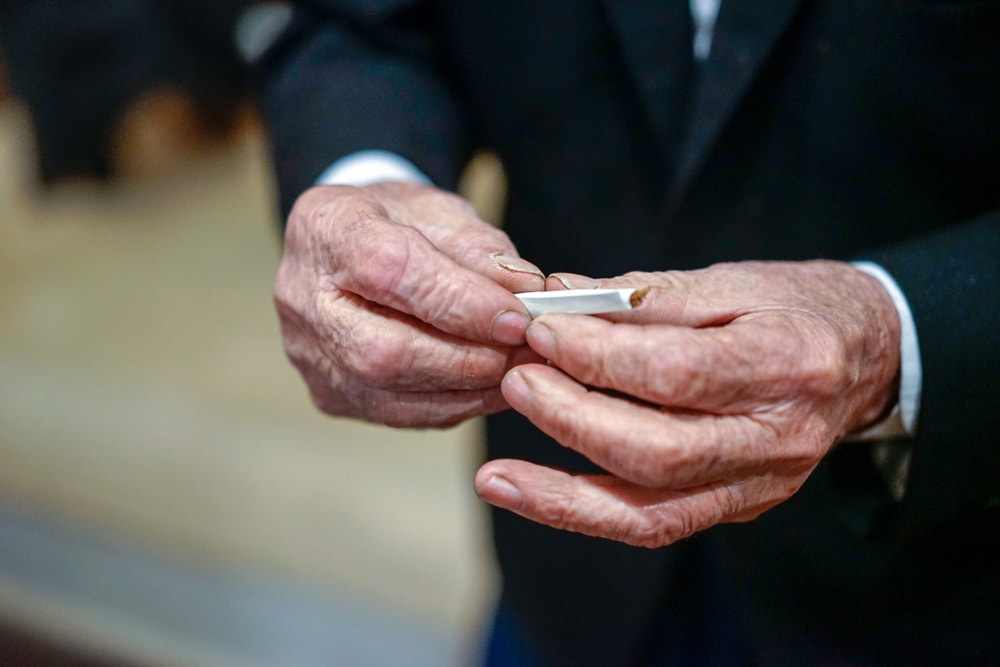“The benefits of quitting smoking are proven and immediate regardless of the age of the smoker.”
Elderly smokers are aware of this fact. A stereotypical view of seniors who smoke sees them as irrevocably set in their ways, who have no interest or desire in quitting. The opposite is true. An online survey of 1284 smokers in the US found that smokers over 55 years old had both more regret and were the most unhappy about being smokers:
- 59% of smokers over the age of 55 strongly agreed with having regret about starting smoking
- 86% of smokers over the age of 55 expressed high discontent with being a smoke
Elderly smokers are eager to quit, but the elderly smoking population faces unique challenges regarding smoking cessation that other segments of society do not. We will explore those challenges, as well as examine the effects of smoking in the elderly.
Where it All Began
When most elderly smokers began smoking, as teenagers or young adults, cigarettes were not vilified. On the contrary, in the 1950s and 1960s, tobacco companies were free to market to children and young people, aggressively and nakedly.

A Conscious Effort
A comprehensive study by Dorie E. Apollonio and Stanton A. Glantz, two leading researchers from UCSF, of the history of minimum legal ages (MLAs) to buy tobacco products revealed how tobacco companies went after the youth market.
A few takeaways from the study:
- Tobacco giant RJ Reynolds, as late as 1953, was giving out free samples of candy cigarettes
- As late as the early 1970s, cigarette companies actively fought against the prohibition of giving away free cigarettes as samples to minors
- Minimum age laws have a long history, dating as far back as the 1880s when at least five states put 16 as the legal age to buy tobacco
The existence of minimum age laws in the early 19th century reveals that even with the lack of scientific evidence about the dangers of cigarettes, people still believed that children under a certain age should not smoke. This belief was so firm that 15 states banned the sale of cigarettes to EVERYONE, between the years of 1895 and 1921. The tobacco companies changed all this. Even after states began instituting minimum age laws after the First World War, the tobacco industry knew that age limits would affect their bottom-line.
A Philip Morris internal study of age purchasing laws put it this way:
“Raising the legal minimum age for cigarette purchaser [sic] to 21 could gut our key young adult market … Moreover 66% of all smokers begin smoking at or before age 18, 80% begin before age 21.”
Knowing all they did about young people and life-long smoking habits, the tobacco companies did all they could to make sure that they could still market and sell to anyone under the age of 21.
Controlling Tobacco - A Timeline
- 1963 – Smoking rates begin to decline shortly before the release in 1964 of the Surgeon General’s Advisory Committee report linking cigarettes and lung cancer
- 1963 to the present day – Total per capita adult consumption of cigarettes has gone down 70%
- 1971 – Cigarette ads are banned from radio and television
- 1988 – New Surgeon General’s report classifies, for the first time, smoking as an addiction
- 1998 – The Masters Settlement Agreement (MSA) awards billions of dollars to state governments as compensation from the tobacco companies for costs associated with smoking-related illnesses
Risks of Smoking in Old Age
Smoking plays a significant role in determining someone’s life expectancy.

Even though smoking reduces life expectancy, smokers do survive until 65 and older. The question then is why elderly smokers continue to smoke, even if they do make it to old age and despite all that is known about cigarettes. Elderly smokers face the same risks to their health as everyone who smokes does.
Only, because of their age, the effects are more severe and irreversible:
- 70% of all smoking-related deaths due to cancer are among people over 60 years old
- Older smokers are more susceptible to lung-related illness and infections like pneumonia, which, at their age, can be fatal
- Smoking exacerbates age-related illnesses like osteoporosis (weaker bones), cancer, and cardiovascular diseases
- Smoking can lead to early cognitive dysfunction and impairment in the elderly
- Smoking can decrease overall physical strength and performance in people over 65
Quitting Smoking for Older Adults
Quitting smoking is something that should be encouraged especially among the elderly. Unfortunately, even medical professionals sometimes do not take advantage of “teachable moments” – when elderly patients are hospitalized for a smoking-related condition – to push aging smokers to cessation programs.

This age-based bias on the part of medical practitioners has further negative consequences:
- Older patients do not make the connection between their diagnosis and smoking
- They then do not believe that cigarettes are responsible for their hospitalization
- Not understanding their condition is tied to smoking makes them less willing to quit
- Unwillingness to quit foreshadows an unsuccessful quit attempt
The fact that doctors and nurses do not take advantage of a patient’s hospitalization flies in the face of evidence showing elderly patients do, in fact, benefit from this type of quit smoking advice.
An Australian study looked at the differences between intervention and non-intervention among elderly smokers. It found that among the participants who were encouraged to try NRTs, counseling, and other smoking cessation methods, between 20-25% were found to stay off cigarettes. The group who received no support did not stop or even try to quit smoking.
Health and Other Benefits of Quitting
The health benefits of quitting for smokers in old-age include:
Living longer – 23% of smokers who quit in their 60s had a lower risk of death compared to those who continued to smoke
Lower chances of getting sick – Smoking aids in the development of several age-related diseases, like strokes, heart attacks, COPD, emphysema, quitting reduces the risk
Lower risk of heart attack – Within five years of quitting, the chances of suffering a heart attack go down by 40%

“Living longer – 23% of smokers who quit in their 60s had a lower risk of death compared to those who continued to smoke.”
Other benefits of quitting are:
- Sense of taste, smell, improve dramatically
- The stench of cigarettes is gone
- No more yellowing of skin or teeth
- No more loss of breath doing everyday things like climbing stairs or doing housework
Supporting Seniors
Seniors who smoke have a higher chance of developing life-threatening illnesses, which is why encouraging them to quit is a crucial step. Stopping people from starting smoking remains the best way to combat all the negative consequences associated with cigarettes, but fighting a life-long smoking habit is also possible.
Getting elderly smokers to quit involves the same methods for anyone looking to stop:
- Participate in an organized smoking cessation program, like the one offered by the American Cancer Society, or the American Lung Association
- Consult a doctor regarding NRT (nicotine replacement therapies) like nicotine gums, lozenges, or nasal sprays
- Use quit smoking medication (only if prescribed by a doctor) like Chantix or Zyban
A small segment of seniors is turning to vaping devices to quit smoking. E-cigarettes are not recognized by the FDA as smoking cessation tools, and there is a danger that seniors, like most people who vape, will become dual users. Meaning, they will vape, and smoke as well.
Elderly smokers need to have what anyone who wants to quit smoking needs to have: a desire to quit. When given the proper encouragement and support, seniors who quit are just as successful as anyone else.






Tony Wethington
May 12, 2021 at 11:41 amGrowing up in the late 50’s most of my family were smokers. It seemed that most adults smoked and although I knew that smoking wasn’t allowed, I began sneaking smokes in my teenage years. Fortunately, I quit smoking in my early 20’s. Unfortunately, my Mother died of Lung Cancer in her early 70’s much, much sooner than she should have.
Lora Jones
May 4, 2021 at 3:10 amThis is easier said than done. It upsets me that the government is now talking about banning menthol cigarettes. I wonder if they had banned all cigarettes a long time ago how many lives they would have saved.
Kenny Benson
December 21, 2019 at 3:34 pmI’m 56 and my wife is 79. She started smoking when she was 12. We got married after I graduated from high school in 1981. Back then, smoking was still popular and in vogue and I thought she looked sexy and sophisticated when she smoked. Oddly enough, the reason I never took up the habit was because she wouldn’t let me.
She has tried to quit more times than I can remember during our 38 year marriage. Smoking has taken it’s toll on her health and it is robbing me of time with her. I don’t resent her for smoking. I resent what smoking is doing to her and I’d give anything if she could quit. But I know she would if she could.
Robert wheeler
April 22, 2018 at 6:46 pmI live with a vet who has terminal cancer and fibrosis of the lungs he is exposed to 2 and 3rd hand smoke due to being in a aprtment from hell .our landlord told us it was a smoke free building didnt tell us about the air vents being run through all aprts .smokers are outside near front entrance and blow smoke in uour face. Landlord does nothing and either does health depart elderly abuse